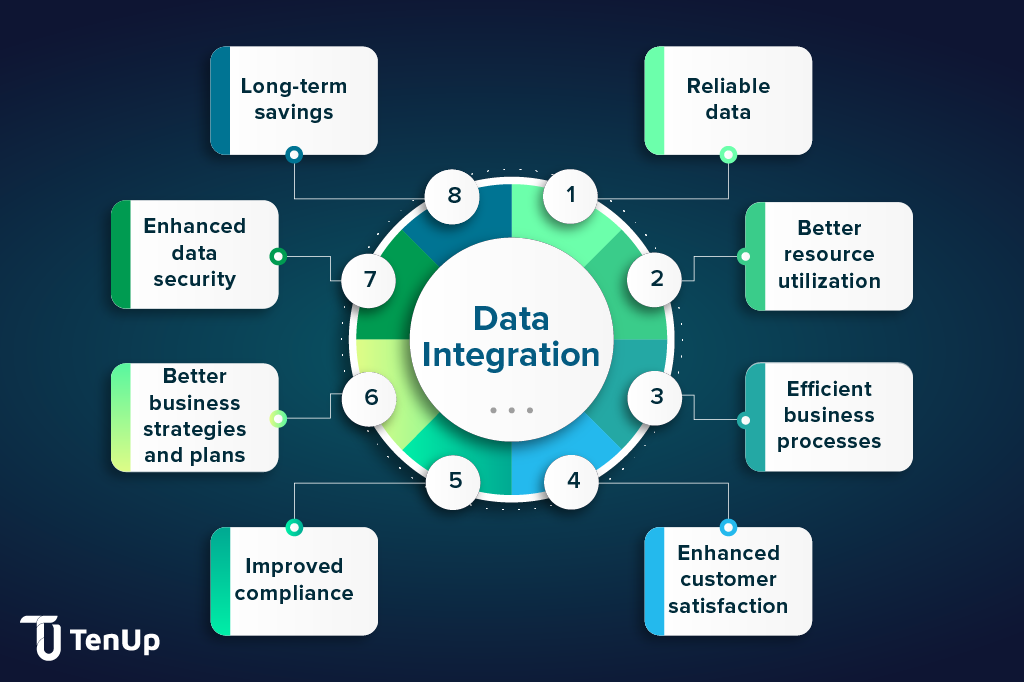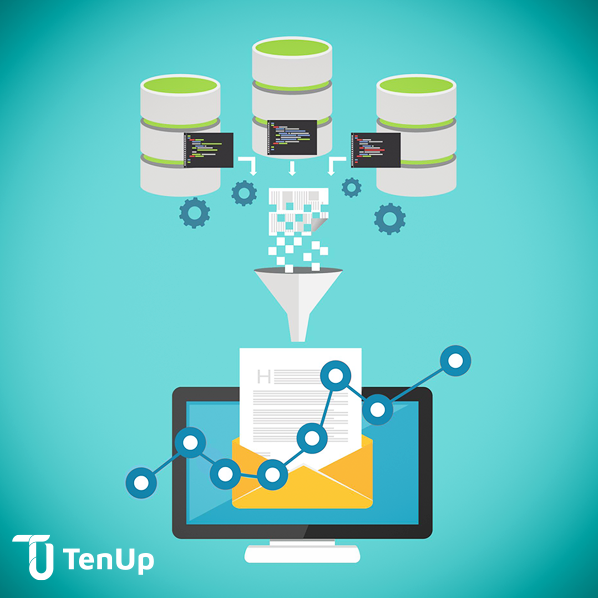What is Data Integration? A Complete Overview
Data Integration is the process of combining, transforming, and centralizing data from multiple sources—both internal and external—into a unified system. This ensures seamless access to accurate, real-time data for Data Analytics and Business Intelligence (BI).
Modern businesses generate vast amounts of structured and unstructured data across various platforms. Without integration, data silos form, leading to inefficiencies and incomplete insights. Data Integration eliminates these silos by consolidating information into a centralized repository, such as a Data Lake or Data Warehouse.
By implementing a robust Data Integration strategy, businesses can:
- Improve decision-making with reliable, real-time insights
- Enhance operational efficiency by streamlining data flow
- Ensure data consistency and accuracy across departments
With the rise of big data, AI, and automation, Data Integration is no longer optional—it’s a necessity for business growth and digital transformation.
Data Integration is a core component of the comprehensive Data Management process that every business needs. Modern business organizations generate data almost every hour and must manage this ever-growing data continuously. So, an effective Data Management strategy requires continuous Data Integration, making it essential for business organizations.
Top Benefits of Data Integration for Business Growth
Data Integration benefits businesses in many ways apart from providing a unified version of data. It helps the organization with its top-line and bottom-line, like sales and operational costs. Do you know that the global data integration market is expected to increase by 12.32% from USD 13.6 Billion in 2023 to USD 43.38 Billion by 2033, according to Precedence Research? The research also states that businesses now recognize data integration as the only realistic strategy to optimize business potential, leading to this market growth.

Let’s understand why is Data Integration important to businesses with its following advantages:
-
1. Reliable data
The Data Integration process also involves data transformation efforts. They remove duplicate data entries and inconsistencies, eliminate errors, and create standardized structures for better analytics and reporting. Also, the data from all the applications, systems, and platforms across the organization becomes accessible in one place. So organizations can rely on the integrity of their data assets to make confident data-backed decisions.
-
2. Better resource utilization
Data Integration helps identify shadow projects within the organization. Such projects manage data independently, creating silos. It leads to a waste of resources on irrelevant projects. With Data Integration, organizations get better visibility of human resources and assets used across projects, leading to better resource utilization.
-
3. Efficient business processes
As all departments within the business organization refer to the same data, they can coordinate better to serve their customers. It leads to streamlined and quick practices and processes aimed at improving the overall productivity and efficiency of the business. Data Integration also helps organizations spot redundancies and repetition. They can automate mundane manual processes to eliminate human errors.
-
4. Enhanced customer satisfaction
Organizations can collect and analyze customer data from different touch points including their feedback on products and services, social media engagement, sales transactions, interactions with the support team, etc. It helps them understand customer sentiment, preferences, and behavioral patterns. With this knowledge, businesses can better serve their customers and satisfy them.
-
5. Improved compliance
The Data Integration process increases the visibility, availability, and accessibility of business information. So, business transactions have no missing values. There’s transparency and orderliness in business data. It helps organizations meet regulatory requirements.
-
6. Better business strategies and plans
As Data Integration enables better Data Analytics and Business Intelligence, organizations get insights into market trends, and consumer behavior, needs, and expectations. It helps them identify gaps or opportunities in the marketplace. They can leverage this information to improve their existing products and services or offer new ones to gain a competitive edge in their industry.
-
7. Enhanced data security
Businesses often have complex and large data sets from unconnected sources like CRM, partner data, financial systems, web analytics, marketing automation, IoT devices, etc. Data security becomes complex and expensive when the business data is stored in different databases across locations. As the Data Integration process facilitates storing business data in a central repository, it is easier to safeguard. Organizations can apply high-end security measures including role-based access, advanced encryption, multi-factor authentication, etc. to enhance data security.
-
8. Long-term savings
While implementing Data Integration requires an initial investment, most organizations quickly realize the return on investment (ROI) with efficient operations and valuable insights. Modern businesses understand that having Data Integration as a part of their Data Management strategy is a necessity rather than a choice. Because, all advanced analytics and reporting involving AI, ML, IoT, Robotics, etc., necessitate having reliable, centrally stored data. These Business Intelligence efforts help organizations meet the evolving needs of their customers and stay competitive while increasing profitability and business growth.
Data integration relies heavily on effective data ingestion processes to ensure that all relevant data is collected and prepared for analysis. For more insights on how data ingestion can unlock valuable insights from your data, check out our blog on How Data Ingestion Unlocks the Wisdom Within Data.
Need Data Integration to Drive Business Agility? We can help!
Key Challenges in Data Integration & How to Overcome Them
As with any change, businesses often face internal challenges in adopting Data Integration. They include:
-
Lack of awareness
Many organizations undermine the importance of data and its management, leading to lower productivity and efficiency. They rarely pay attention to the different data sources within the organization. Where do they originate, and how do they create data silos? What kind of information do they carry, and is it enough? Which other information is required by the organization to make informed decisions? And most importantly, how do they close this gap?
-
Investment in technological improvements
Businesses prioritize running operations smoothly. So, they prefer to spend on quick fixes for temporary issues. This leads to tech improvements taking a backseat. The real challenge lies in identifying that the organization has technical needs and the economic impact of not upgrading technology, along with the rest of the industry players.
Businesses can overcome these challenges with solutions like the following:
-
Understanding data
The decision-makers need to understand what data they need, and whether it is available. How does the data flow within the organization? Is the same version of data accessible and visible to all the functional units, or are they relying on siloed data?
-
Identifying tech needs
Businesses prioritize running operations smoothly. So, they prefer to spend on quick fixes for temporary issues. This leads to tech improvements taking a backseat. The real challenge lies in identifying that the organization has technical needs and the economic impact of not upgrading technology, along with the rest of the industry players.
-
Selecting the right technology partner
Experienced software development companies skilled in digital transformation and data engineering provide custom solutions and better ROI. They are more trusted and reliable as you are not hiring a single developer but a team of data architects, designers, developers, and managers. Also, their projects and client testimonials speak for themselves.
Maximize Data Integration Benefits with TenUp’s Expertise
Businesses need advanced analytics and reporting capabilities to stay in the cut-throat competition. This emphasizes the need for effective Data Management, and most importantly for accurate, reliable, up-to-date, and real-time data. We’ve already learned about the benefits and challenges of Data Integration for Businesses. However, integrating data from multiple heterogeneous sources in itself is a massive technological challenge. You need scalable data integration solutions that can handle the increasing data volume and complexity of your growing business. Complex issues like highly disparate data sets, poor data quality, and incompatible business platforms often create roadblocks in the Data Integration process.
Our expertise and experience as a Data Engineering Services Providing Company can help you overcome such technical challenges. We can understand your requirements and design personalized solutions that deliver favorable outcomes.Let’s connect for a quick exploration call and identify the most-suited data integration strategy to resolve your data-related issues.

